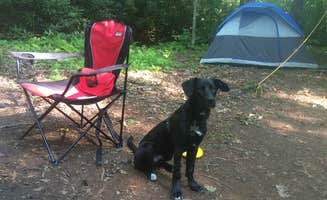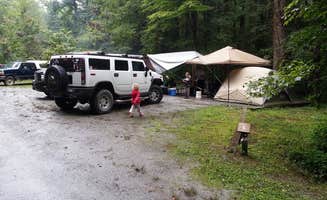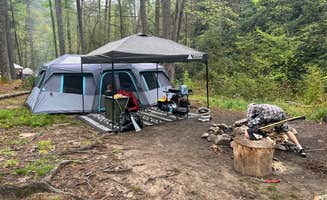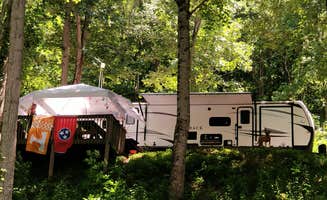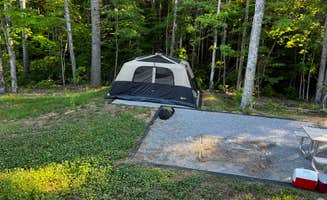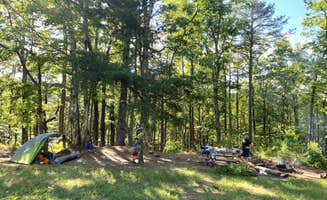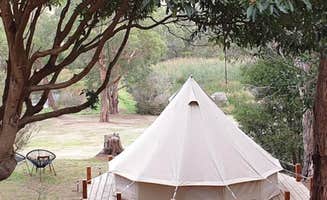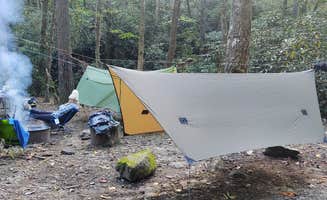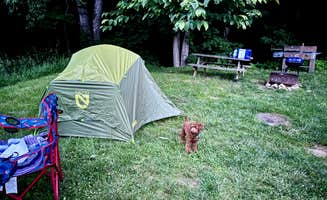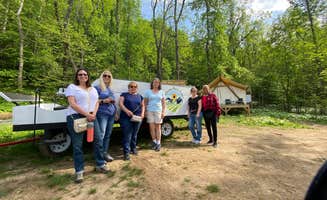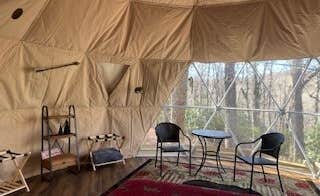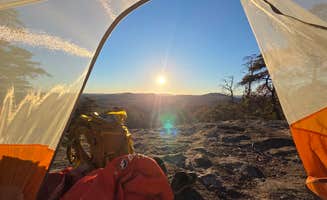Tent camping near Collettsville, North Carolina offers opportunities in a mountainous region where elevations range from 1,200 to 4,000 feet throughout Wilson Creek and surrounding areas. The region experiences significant temperature variations with summer highs averaging 85°F while winter nights frequently drop below freezing. Many campsites sit along rocky creek beds requiring careful tent placement, with several campgrounds positioned within the Wilson Creek Wild and Scenic River watershed.
What to do
Creek swimming: Access multiple swimming spots at Steele Creek, where campers find natural pools along the creek. One visitor noted, "This area is beautiful and pure peace compared to the others in the area! This is by far the quietest, nicest, cleanest, site yet!" Another camper mentioned "a walking trail at the end of the road about 100 feet from our site, that had the best swimming hole at the end of it, where you can jump in."
Waterfall hikes: Trek to nearby falls at Mortimer Campground, which offers direct access to trailheads. A recent visitor explained, "Beautiful, clean grounds with access to a 1/2 mile round trip hike to a waterfall on the property!" Many campers appreciate this accessibility, with one noting, "There are bathrooms and showers. There are trails and even a waterfall within half a mile from camp."
Fishing: Cast for trout in Wilson Creek and surrounding waters, particularly at deeper pools. Numerous fishing spots exist throughout the area, with varying degrees of access. At Blue Bear Mountain Camp, one visitor reported, "Once you get there, there is a nice creek and we caught a trout in the pond right away."
What campers like
Natural soundscapes: Fall asleep to flowing water at several campsites along creeks. At Catawba River campground, a camper described, "The sites down by the water are awesome. The sites were all so unique and cozy in a little circle path that takes you down by the water. So many nice little places to hang a hammock and relax."
Cooler temperatures: Escape summer heat at higher elevation sites. At Blue Bear Mountain Camp, a visitor observed, "The weather is so much cooler in the summer there (70-80 in July!). The elevation is high so weather is nice for those trying to escape the summer heat."
Privacy between sites: Find secluded camping at less developed areas. While many campgrounds offer some privacy, this varies significantly by location and site number. At Paddy's Creek campground, campers enjoy well-maintained facilities with privacy. One camper reported, "The campsite was impeccably maintained with the cleanest bath/shower house I have ever experienced camping."
What you should know
Road conditions: Prepare for rough drives to most camping areas. Many access roads are unpaved and can be challenging, especially after rain. At Black Bear Campground, travelers find newer facilities but should still prepare for mountain driving. A visitor advised, "This is a brand new tent and cabin campground built by Duke Energy and run by McDowell county on Lake James. There is a boat ramp very close by, a fishing dock, picnic area, trails in and around the campground."
Limited supplies: Stock up before heading to remote sites. Most campgrounds are 30-45 minutes from grocery stores or supplies. One camper at Blue Bear Mountain Camp noted, "They do not have water hookups - you fill your camper tank with water at the office area."
Site limitations: Check tent site specifications when booking. Some campgrounds have specific tent pad sizes or terrain challenges. At Steele Creek, a camper observed, "Maybe I missed this in the reviews, but all but 1 site were best for tents. I drove in to camp in my car and there was only 1 spot, which is by the creek crossing, and it was already taken."
Tips for camping with families
Swimming safety: Choose sites with gentler water access for young children. Some creeks have swift currents after rain, requiring supervision. A camper at Camp Attocoa found this private campground especially accommodating: "Private owned, water and wood on site. The owner will have you park and will haul you and your gear in and out."
Wildlife awareness: Store food properly as bears are active in the area. Using bear-resistant containers or proper hanging techniques is essential. At South Mountains State Park, a camper appreciated the "BEAR BOX! Woot!!" noting that "Water is just down the hill. It's ample and clear."
Weather preparation: Pack for significant temperature drops at night. Even in summer, mountain nights can be chilly, requiring appropriate sleeping gear. At Mortimer Campground, one visitor suggested, "Definitely plan ahead on provisioning bc it's about 45 mins drive into the national forrest."
Tips from RVers
Access limitations: Many tent camping areas near Collettsville cannot accommodate larger RVs. Roads to popular tent areas often have tight turns or steep grades prohibitive for larger vehicles. Even at established campgrounds like Blue Bear Mountain Camp, a camper noted, "The state maintained gravel road used to access campground was narrow and would be difficult to get a large camper up there, although there were lots of large ones there."
Alternative options: Consider Lake James area campgrounds for better RV access. These sites offer more accessible roads and larger camping pads. At Paddy's Creek, a visitor observed, "All the tent pads except for the ranger seemed to have one or two stairs from the parking spot, so I'm not sure it could be managed with any kind of camper."
Utility connections: Most tent-focused campgrounds offer minimal hookups. RVers should be prepared for dry camping at many locations. One Blue Bear Mountain Camp visitor mentioned, "They have spots with electric hookups. They have a dump station where you can empty your tanks on your way out."


